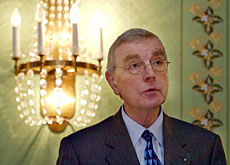Private bankers stay healthy for the wealthy

Swiss private bankers say they are not endangered by increasing pressure from the big banks in chasing and managing wealthy clients.
They argue that although there are still plenty of rules and regulations that take up their time, 2006 should be a year when they can concentrate more on their businesses.
“It is funny that everybody wishes to know if we are the last pandas or a dying breed,” Pierre Darier, president of the Swiss Private Bankers Association, told swissinfo.
“In fact, we have never been as strong because [although] we are fewer we are more powerful in the sense that the business has been growing and we are successful.”
At a news conference in Bern on Thursday, Darier explained that the strengths of the 14 members of his association were the continuity and confidence they built with clients over the long term.
“We are in the business of catering to the needs of fairly wealthy families, structuring the way they deal with us and managing the money as best we can, and hopefully with good performance and in the end passing on the money to the next generation.”
Darier, a partner with Lombard Odier Darier Hentsch & Cie, said that clients who dealt with the private bankers – where at least one partner within the bank assumes unlimited liability for the bank’s commitments – generally came with money that was set apart as a security in the longer term for the family.
“Therefore they want it to grow regularly… without taking a big risk.”
Pressure
But the likes of Swiss banking giants UBS and Credit Suisse have increasingly been focusing their attention on wealthy clients in recent years and putting pressure on the private bankers.
Among the advantages for the “big boys” are economies of scale, IT strengths and broad distribution and product possibilities.
“By remaining as a company that depends on your own wealth and not having access to the capital markets because we are not quoted [on the stock exchange], we restrict ourselves to internal growth,” Darier said.
“We will never gather the funds sufficient to buy others but this is also a discipline because it means we [have to] focus on internal growth.”
In recent years the number of private bankers has fallen as the sector consolidates but Darier does not think that this represents a particular threat as long as they manage their business in a “clever” way.
He said he did not believe the private bankers were particularly subject to consolidation. It was a matter of finding the right people to continue the business.
“Provided we have this new generation coming up, I see no threat for our businesses.”
Permanent change
Another private banker, Christian Rahn from Rahn & Bodmer in Zurich, described the market as being in a state of permanent change.
But, he said, there was still a broad client base that wanted independent, professional and individual service from private bankers who concentrated on a specific niche.
“The more the conglomerates become bigger on the wealth management market, the more the niche will become important,” Rahn said, adding that there was a place in the banking world for both the big players and the small and medium-sized operations.
He likened the situation to the retail world, arguing that a small, specialised shop could always exist next to an Aldi or other hard discounter.
“The success of today’s private bankers shows that the need for personal and neutral service is still there.”
The Swiss Bankers Association echoed the feeling that there is room for both big and small in the Swiss banking sector.
“Some of the smaller boutique banks are quite happy chugging along doing what they’ve always done, namely offering the classic Swiss private banking service from Switzerland,” spokesman James Nason said.
“At the end of the day, however, Switzerland remains world leader in private banking, managing an estimated third of all internationally invested private wealth.”
swissinfo, Robert Brookes
The Swiss Private Bankers Association was founded in 1934 when the Swiss Banking Law came into force.
It has 14 members which employ about 5,000 people throughout the world.
Based in Geneva, the association defends the professional interests and status of the Swiss private bankers.
It also plays a decisive role in maintaining favourable legal conditions for asset management in Switzerland.
Private bankers are businesspeople in the private banking sector who use their own capital to conduct their business, assume unlimited liability and have power to take independent decisions.
The term “private bank” is more general and can also apply to banks that are incorporated as limited companies, in particular when they are controlled by a group of reference shareholders and are active in the private asset management sector. Some banks have even included “private bank” in their name.
“Private banking” does not refer to an establishment but to a banking activity serving private individuals who want to have their assets managed professionally.

In compliance with the JTI standards
More: SWI swissinfo.ch certified by the Journalism Trust Initiative










You can find an overview of ongoing debates with our journalists here . Please join us!
If you want to start a conversation about a topic raised in this article or want to report factual errors, email us at english@swissinfo.ch.